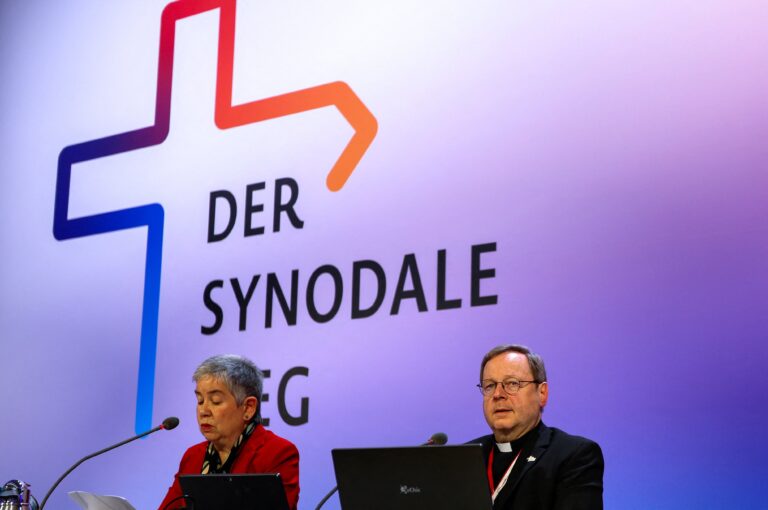Will the next meeting of the German bishops end in a showdown? The Permanent Council of the German Bishops’ Conference is scheduled to convene on June 19 and 20 in Berlin. It is made up of all diocesan bishops and will have to take groundbreaking decisions, especially regarding finance. In the run-up to the meeting, there is speculation that the continuation of the Synodal Path reform process is at risk.
Bishops and lay representatives had discussed reforms in several rounds in the Synodal Path consultations launched in 2019 in response to the abuse scandals. The themes were greater control of the bishops’ power, the role of women in the Church as well as the Church’s approach to gender diversity. The process is to lead to a permanent Synodal Council via an intermediate step in the form of a Synodal Committee.
The Vatican has repeatedly responded to the reform plans with sharp criticism which has had an impact even on the pro-reform bishops. A decision on funding staff and material resources for the Synodal Committee has so far been postponed and is now back on the agenda.
Common financial matters are the domain of the Association of German Dioceses (VDD) in which the dioceses have bundled their joint activities. The VDD currently has a budget of around 130 million euros, to which all dioceses contribute in proportion with the size of their Church tax income.
Six-figure
However, only a high six-figure sum is to be spent on the Synodal Committee and the 74 committee members have already been appointed, including all 27 diocesan bishops.
In the Synodal Path talks, 88 percent of the bishops voted in favour of the formation of the Synodal Committee. In the VDD, however, financial issues must be decided unanimously.
Germany’s Catholic News Agency (KNA) has learned that Bishop Stefan Oster of Passau informed the central steering body of the VDD that he definitely could not agree to the project, and that three other bishops would also refuse.
Bishop Bertram Meier of Augsburg has said the bishops face a dilemma. He supported the plan “to promote and stabilise synodality as a lifestyle of the Church in Germany”. At the same time, he pointed to the Vatican’s misgivings, adding: “As long as neither the exact objectives nor the concrete powers of the Synodal Committee have been clarified, the matter is not yet ready for me to make a decision. This concerns my participation as well as the co-financing of the committee”.
Blocked
However, the phrase “coalition of the willing” is also doing the rounds, especially among members of the Central Committee of German Catholics (ZdK). The vast majority of German diocesan bishops would not allow themselves to be blocked by a minority and would, if necessary, bypass the VDD to fund the Synodal Committee, ZdK members have said.
In the past, the bishops have always managed to settle their differences in a way that didn’t impair budget decisions. But if they fail to do so this time, the question of who decides on the use of Church taxes in the future will inevitably arise. In that case a lot more will be at stake than a few hundred thousand euros for the Synodal Committee.
Germany’s lay Catholics have recently demanded that the country’s bishops release funds to pay for the agreed reforms. “We expect the German bishops to continue the reform process of the Synodal Path,” the president of the Central Committee of German Catholics (ZdK), Irme Stetter-Karp, said in Berlin on Thursday.
Hesitation
The hesitation on the part of some bishops to provide the planned Synodal Committee with the necessary funding, which became public on Thursday, was irritating, she said. “An overwhelming majority of the bishops voted in favour of the Synodal Committee on the Synodal Path. Breaking one’s word destroys credibility,” Stetter-Karp warned.
It has been reported by KNA that some bishops did not want to release funds for the country’s Synodal Path. According to the report, the amount involved is in the higher six-digit range. The bishops will next meet for their Permanent Council on June 19 and 20.
The joint consultations and decisions are to lead to a permanent Synodal Council in 2026 via an intermediate step in the form of a synodal committee. The Vatican has declared such a council inadmissible.
Stetter-Karp went on to explain that the mistrust of Vatican representatives regarding the German reform project had obviously had an effect. However, she said, this was based on false assumptions. The Synodal Committee would neither harm the bishops nor damage their office. “It is about the continuation of the successful path we have taken together with the German bishops,” she said. “Only through reforms, as we have discussed in three years on the Synodal Path, can the causes of the abuse scandal be dealt with in the long term.”
Originally reported by KNA Germany.



